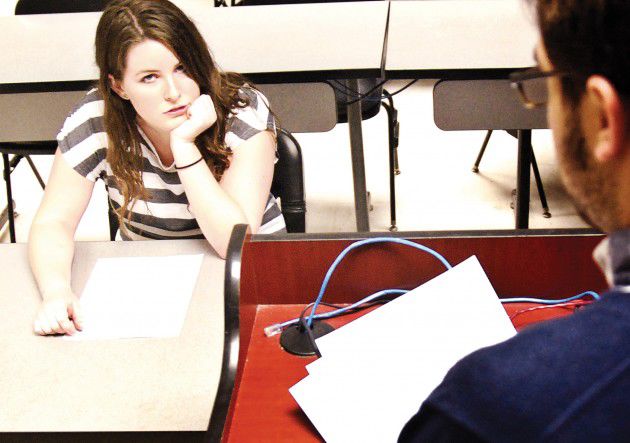How to know it’s not you, it’s your professor
March 24, 2010
Remember that class you were going to love and ended up dreading every Monday, Wednesday and Friday? Or the one that was going to be a stand-in naptime and turned into your favorite? If you think about what made these classes great or disappointing, chances are you can point to the professor. In order to avoid spending the next semester in classes that won’t live up to your expectations, The Villanovan offers you its version of U.S. News’ 10 Warning Signs of a Bad Professor.
1. The professor is boring.
If listening to the person in the front of the room speaking is more tranquilizing than your mother’s lullabies and a mobile when you were 2 years old, you won’t be able to sit through 50-or 75-minute lectures listening to him. Your professor should be engaging, making you want to listen to what he or she has to say.
“It’s hard to care about what a professor is saying when he just rambles on without trying to make it interesting,” says junior Andrew Hanley.
2. The professor is bummed out.
Both enthusiasm and misery are contagious. And if a professor is full of the latter, even the most interesting subject will seem as depressing as Villanova’s basketball season.
3. The professor doesn’t give out a syllabus.
First of all, what is syllabus week without the coveted syllabi? More importantly, a professor who fails to let his or her students know the plan for the course likely doesn’t have a plan for the course. You could end up on a wild ride of sloppy lesson plans and assignments that sneak up on you at the last minute.
4. The professor isn’t clear about the requirements and how much they count.
If you’re a student who obsessively checks WebCT for every possible grade, you will go insane in a class where your grade is kept in the dark. Often it isn’t just students who are unsure of how much assignments count, but the professor as well who may make last-minute decisions on the matter.
5. The professor assigns an impossible amount of work or no work at all.
If you feel overloaded, especially at the very beginning of the course, the professor probably has unreasonable expectations of students — or doesn’t realize that you have four or five other classes on your schedule. Sophomore Amanda Leggio says that one of her professors “fills the class with overwhelming anxiety that overshadows every other class I am taking.”
While the class with no work is enticing, you know from back in elementary school that homework reinforces your learning, and without it, you may walk away with nothing gained.
6. The professor has incredibly petty rules.
It’s not just annoying when one-fourth of the syllabus is dedicated to detailing what is allowed and when, but it also indicates a professor who would rather be Big Brother than Mr. Feeny.
7. The professor can’t fill the whole class period.
Ignore this one for the first class period or two — remember the all-important syllabus week! However, if you find yourself consistently getting let out well before your class’s scheduled end, you are not getting your money’s worth and would do well to find a place where your or your parents’ dollars won’t be wasted.
8. The professor seems unsure about the material.
You are here to be taught. It makes sense that those who teach you should be more knowledgeable than yourself, right? Mumbling and hesitation may be symptoms of stage fright, especially for younger professors, but they could also reveal someone who doesn’t know what he’s talking about. That, if anything, should be a sure sign to run.
9. The professor presents the material in a confusing way.
Even if you are a student who detests lectures, you can agree that some lectures are good. These are the ones that are clear and easy to follow — the ones where you write good notes because you know what is important and should be remembered. If listening to a lecture is more confusing than the assigned Descartes reading itself, you should find someone else to listen to.
10. The professor never involves the students.
At the most, a class should involve debates, presentations and discussions.
At the least, it should involve periods where students can ask questions of their professor. People learn best in a dynamic class. If yours is a one-man show, you are less likely to care about the material and learn it.












